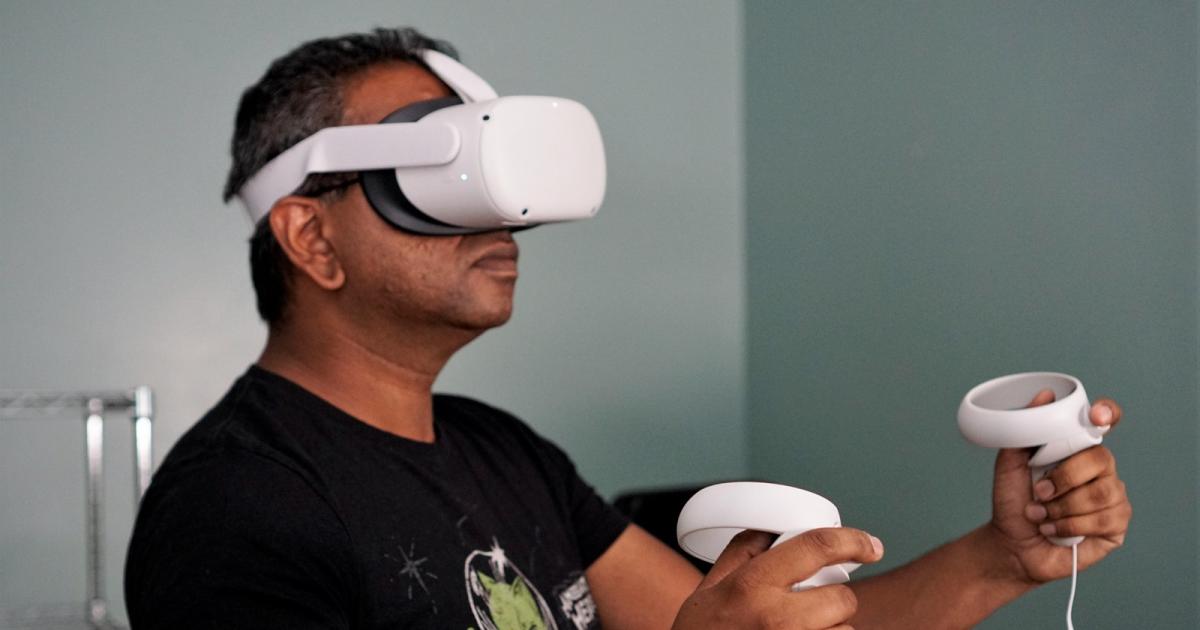Meta’s Quest 3 headset could feature color cameras for more lifelike pass-through video

Meta’s Quest 3 VR headset won’t arrive until later this year. However, now we have a better idea of what to expect from the device courtesy of Bloomberg’s Mark Gurman, who says he went hands-on with a prototype to better understand how Quest 3 will stack up against Apple’s forthcoming mixed-reality headset. Gurman reports the prototype, codenamed Eureka, “feels far lighter and thinner” than its predecessor. He says the head strap “seems a bit stronger,” too, and uses fabric on the sides instead of plastic like the Quest 2.
More consequentially, the front of the device reportedly features a new design incorporating an enhanced sensor suite. Three “vertical pill-shaped sensor areas” house two color video pass-through cameras, two standard cameras and a depth sensor. As Gurman notes, that’s a significant upgrade from the Quest 2, which doesn’t come with color pass-through or a depth sensor. The presence of the former means you won’t need to designate the walls in your play space.
The front lower sides of the headset feature tracking cameras, while the bottom has a volume rocker and a wheel to adjust interpupillary distance. That means you can tweak the Quest 3’s IPD without taking the headset off, something you can’t do with the Quest 2.
“The actual clarity and VR displays within the Quest 3 feel similar to those in the Quest 2 — despite the resolution being rumored to be slightly higher,” Gurman writes, while noting pass-through for mixed reality applications and overall performance is significantly improved over the Quest 2. Speaking to the former, he says there’s a “night-and-day improvement” thanks to the added dual RGB cameras. “I was even able to use my phone while wearing the headset, something that often feels impossible on a Quest 2,” he adds. As for performance, Quest 3 reportedly features Qualcomm’s next-generation Snapdragon XR2 chipset, leading to shorter app launch times and more consistent frame rates in games.
Notably, Gurman says the Quest 3 doesn’t include face and eye tracking, which means the headset won’t support foveated rendering. That’s a feature you can find on the Quest Pro. It allows the system to prioritize its limited computing resources on areas where you’re looking. Another feature the Quest 3 won’t carry over from the Quest Pro is controller-mounted cameras, though Gurman says Meta is trying to improve peripheral tracking in other ways.
“Meta hasn’t yet settled on pricing for the device, but people involved in its development believe it may come in higher than the Quest 2’s $400,” Gurman notes, adding the company could keep the Quest 2 around “at a lower price.” He adds Meta doesn’t plan to release a new Quest Pro “anytime soon since the first version bombed.” The company reportedly plans to announce the Quest 3 sometime in October, which aligns with what company executives have said in the past when asked when consumers can expect a new Quest headset.
Published at Sun, 28 May 2023 15:56:45 +0000





